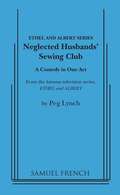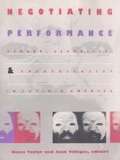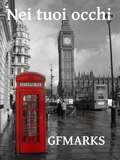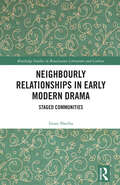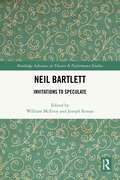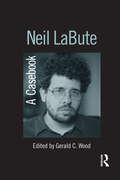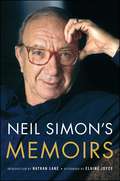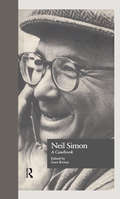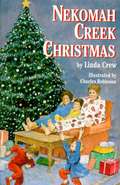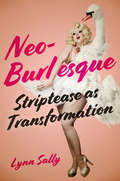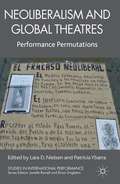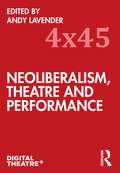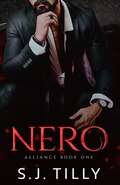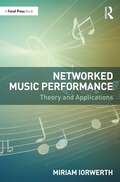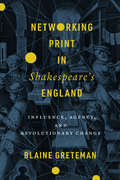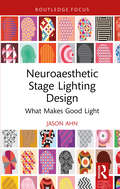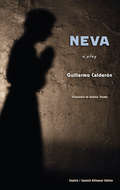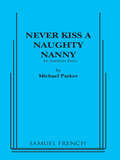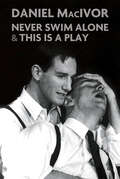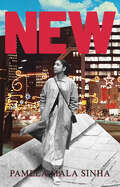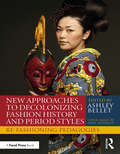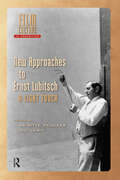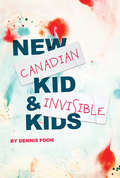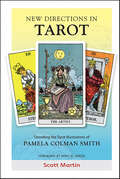- Table View
- List View
Neglected Husbands Sewing Club
by Peg LynchAn Ethel and Albert play. When a wife is too busy with bridge clubs and bazaars to sew buttons and mend rips, a man feels neglected. Albert forms a sewing club with other husbands-- and they think they are pretty funny discussing hairdo's and calories while they thread needles and darn socks. The joke backfires when the women overhear and prove that two can play at this game. Five husbands and five wives meet on the battlefield of home repairs.
Negotiating Performance: Gender, Sexuality, and Theatricality in Latin/o America
by Diana Taylor Juan VillegasIn Negotiating Performance, major scholars and practitioners of the theatrical arts consider the diversity of Latin American and U. S. Latino performance: indigenous theater, performance art, living installations, carnival, public demonstrations, and gender acts such as transvestism. By redefining performance to include such events as Mayan and AIDS theater, the Mothers of the Plaza de Mayo, and Argentinean drag culture, this energetic volume discusses the dynamics of Latino/a identity politics and the sometimes discordant intersection of gender, sexuality, and nationalisms.The Latin/o America examined here stretches from Patagonia to New York City, bridging the political and geographical divides between U.S. Latinos and Latin Americans. Moving from Nuyorican casitas in the South Bronx, to subversive street performances in Buenos Aires, to border art from San Diego/Tijuana, this volume negotiates the borders that bring Americans together and keep them apart, while at the same time debating the use of the contested term "Latino/a." In the emerging dialogue, contributors reenvision an inclusive "América," a Latin/o America that does not pit nationality against ethnicity--in other words, a shared space, and a home to all Latin/o Americans.Negotiating Performance opens up the field of Latin/o American theater and performance criticism by looking at performance work by Mayans, women, gays, lesbians, and other marginalized groups. In so doing, this volume will interest a wide audience of students and scholars in feminist and gender studies, theater and performance studies, and Latin American and Latino cultural studies.Contributors. Judith Bettelheim, Sue-Ellen Case, Juan Flores, Jean Franco, Donald H. Frischmann, Guillermo Gómez-Peña, Jorge Huerta, Tiffany Ana López, Jacqueline Lazú, María Teresa Marrero, Cherríe Moraga, Kirsten F. Nigro, Patrick O'Connor, Jorge Salessi, Alberto Sandoval, Cynthia Steele, Diana Taylor, Juan Villegas, Marguerite Waller
Nei tuoi occhi.
by Gabriela MarquesJulian è un uomo che ha successo nel mondo degli affari e deciso con le donne. Sebbene sia molto attraente non gli piacciono i romanzi, non si interessa alle dichiarazioni e ai fidanzamenti e non gli piace perdere tempo con le persone. La sua vita ruota intorno all'azienda e ai cambiamenti che lo hanno portato nella piovosa Londra. Finché un giorno una tempesta fa entrare Camila nella sua vita, una straniera che vede il mondo in un modo in cui pochi lo vedono. Julian si sente attratto immediatamente, anche se non se ne rende conto. Ma lei porta con sé un triste segreto. Quest'incontro fa sí che il mondo e le concezioni di Julian cambino completamente, gli è impossibile ignorare il sentimento sconosciuto svegliatosi. Non c'è un ostacolo maggiore di quello che ci imponiamo noi stessi. Julian dovrà lottare per riuscire a trattenere Camila nella sua vita.
Neighbourly Relationships in Early Modern Drama: Staged Communities (Routledge Studies in Renaissance Literature and Culture)
by Iman SheehaThe book offers the first sustained examination of neighbourly relationships in early modern English drama, situating the close analyses of the selected plays within contemporary prescriptive literature (such as sermons and conduct books), letters, diaries, pamphlets, ballads, wills, proverbs, as well as the lived realities of early modern neighbourhoods as glimpsed in the historical and legal archives. The originality of the book lies in its topic, in the plays chosen for analysis, including Gammer Gurton’s Needle, written in the 1550s and believed to be the first printed vernacular English comedy, and in the revisionist close readings on offer. The plays span the period between 1550s and 1620s, belong to different genres, and were aimed at different audiences and written for different kinds of playhouses, allowing for conclusions to be drawn about the way genre shapes the treatment of neighbourly relationships, as well as revealing continuities and changes in this treatment over the period under study.
Neil Bartlett: Invitations to Speculate (Routledge Advances in Theatre & Performance Studies)
by William McEvoy Joseph RonanThis book explores Neil Bartlett’s groundbreaking contributions to queer cultural production in the United Kingdom. It adopts a range of critical perspectives, presenting original scholarship on Bartlett’s fiction, theatre, performance, site-specific work, and adaptations, as well as more personal reflections on Bartlett’s influence and legacy.Charting his emergence as a radical queer artist in the 1970s, his writing for performance and theatre in the 1980s to the present day, and his evocative novels about queer spaces and hidden histories, the book considers Bartlett’s works as ‘invitations to speculate’: to view and imagine otherwise, as part of a political aesthetics committed to making queer lives visible. Bartlett’s bold, sensuous, and challenging work crosses genres to find new ways of articulating queer desires, unearthing histories of the body, pleasure, and gay subjectivity while connecting queer experiences across time.Dealing with topics including memory and loss, AIDS and its legacy, marginality, community, and identity, the collection shows how Bartlett embraces the past as a way of reimagining queer futures and demonstrates his status as one of the UK’s leading queer artists.
Neil LaBute: A Casebook (Casebooks on Modern Dramatists)
by Gerald C. WoodNeil LaBute: A Casebook is the first book to examine one of the most successful and controversial contemporary American playwrights and filmmakers. While he is most famous, and in some cases infamous, for his early films In the Company of Men and Your Friends and Neighbors, Labute is equally accomplished as a playwright. His work extends from the critique of false religiosity in Bash to examinations of opportunism, irresponsible art, failed parenting, and racism in later plays like Mercy Seat, The Shape of Things, The Distance From Here, Fat Pig, Autobahn, and the very recent This Is How It Goes and Some Girls. Like David Mamet, an acknowledged influence on him, and Conor McPhereson, with whom he shares some stylistic and thematic concerns, LaBute tends to polarize audiences. The angry voices, violent situations, and irresponsible behavior in his works, especially those focusing on male characters, have alienated some viewers. But the writer's religious affiliation and refusal to condone the actions of his characters suggest he is neither exploitive nor pornographic. This casebook explores the primary issues of the writer's style, themes, and dramatic achievements. Contributors describe, for example, the influences (both classical and contemporary) on his work, his distinctive vision in theater and film, the role of religious belief in his work, and his satire. In addition to the critical introduction by Wood and the original essays by leading dramatic and literary scholars, the volume also includes a bibliography and a chronology of the playwright's life and works.
Neil Simon's Memoirs
by Neil SimonThe complete memoirs of playwright Neil Simon--the author of such iconic works as Lost in Yonkers, The Odd Couple, Biloxi Blues, and The Goodbye Girl--now with a new introduction and afterword.This omnibus edition combines Neil Simon's two memoirs, Rewrites and The Play Goes On, into one volume that spans his extraordinary five-decade career in theater, television, and film. Rewrites takes Simon through his first love, his first play, and his first brush with failure. There is the humor of growing up in Washington Heights (the inspiration for his play Brighton Beach Memoirs) where, despite his parents' rocky marriage and many separations, he learned to see the funny side of family drama, as when his mother screamed thinking she saw a body on the floor in their apartment--it turned out to be the clothes his father discarded in the hallway after a night of carousing. He describes his marriage to his beloved wife Joan, and writes lucidly about the pain of losing her to cancer. The Play Goes On adds to his life's story, as he wins the Pulitzer Prize and reflects with humor and insight on his tumultuous life and meteoric career. Now, with the whole story in one place, Neil Simon's collected memoirs trace the history of modern entertainment over the last fifty years through the eyes of a man who started life the son of a garment salesman and became the greatest--and most successful--American playwright of all time.
Neil Simon: A Casebook (Casebooks on Modern Dramatists #No. 21)
by Gary KonasFirst Published in 1997.The 16 essays and interviews in this volume explore the background and works of Neil Simon, the most successful playwright in American history. Several of the entries trace Simon's Jewish heritage and its influence on his plays. Although Simon is best known as a writer of a remarkable series of hit Broadway comedies, the contributors to this book have identified a number of "serious" recurring themes in his work, suggesting that a reassessment of the playwright as a dramatist is appropriate. Three interviews with Simon and his longtime producer yield valuable facts about the playwright that will, along with the critical essays, aid the scholar seeking new insights into contemporary American drama in general and Neil Simon in particular.
Nekomah Creek Christmas
by Linda CrewRobby Hummer loves everything about Christmas except the school play. He dreads being an elf in green tights.
Neo-Burlesque: Striptease as Transformation
by Lynn SallyThe neo-burlesque movement seeks to restore a sense of glamour, theatricality, and humor to striptease. Neo-burlesque performers strut their stuff in front of audiences that appreciate their playful brand of pro-sex, often gender-bending, feminism. Performance studies scholar and acclaimed burlesque artist Lynn Sally offers an inside look at the history, culture, and philosophy of New York’s neo-burlesque scene. Revealing how twenty-first century neo-burlesque is in constant dialogue with the classic burlesque of the nineteenth and twentieth centuries, she considers how today’s performers use camp to comment on preconceived notions of femininity. She also explores how the striptease performer directs the audience’s gaze, putting on layers of meaning while taking off layers of clothing. Through detailed profiles of iconic neo-burlesque performers such as Dita Von Teese, Dirty Martini, Julie Atlas Muz, and World Famous *BOB*, this book makes the case for understanding neo-burlesque as a new sexual revolution. Yet it also examines the broader community of “Pro-Am” performers who use neo-burlesque as a liberating vehicle for self-expression. Raising important questions about what feminism looks like, Neo-Burlesque celebrates a revolutionary performing art and participatory culture whose acts have political reverberations, both onstage and off.
Neoliberalism and Global Theatres
by Lara D. Nielsen Patricia YbarraHow do theatre and performance transmit and dispute ideologies of neoliberalism? The essays in this collection, now available in paperback for the first time, examine the mechanisms and rhetorics artists, communities, and institutions deploy to produce theatre and performance for global audiences. Neoliberalism and Global Theatres: Performance Permutations explores how the conditions of neoliberalism affect productions of theatre and performance globally, including case studies about New Zealand, Singapore, Vietnam, China, Peru, Mexico, Indonesia, Brazil, India, Nigeria, and the United States. The 18 essays by cutting-edge scholars reveal how performance circulates, transmutes and challenges the disciplinary formations and assumptions organizing contemporary investment in market logics, and, paradoxical notions of freedom. The book brings together diverse perspectives that challenge readers to grapple with the effects of globalized capital on theater, dance, film, visual art, televisual performance and music. Neoliberalism and Global Theatres: Performance Permutations provides an excellent introduction to neoliberalism for arts and humanities students studying performance in a global context.
Neoliberalism, Theatre and Performance (4x45)
by Andy LavenderNeoliberalism, Theatre and Performance tackles one of the most slippery but significant topics in culture and politics. Neoliberalism is defined by the contributors as a political-economic system, and the ideas and assumptions (individualism, market forces and globalisation) that it promotes are consequently examined. Readers will gain an insight into how neoliberalism shapes contemporary theatre, dance and performance, and how festival programmers, directors and other artists have responded. Jen Harvie gives a broad overview of neoliberalism, before examining its implications for theatre and performance and specific works that confront its grip, including Churchill’s Serious Money and Prebble’s Enron. Liesbeth Groot Nibbelink conducts a fascinating discussion with Rainer Hofmann, artistic director of the SPRING Festival in Utrecht, on ways in which performance festivals can respond to neoliberal culture. Cristina Rosa explores contemporary dance in neoliberal Brazil as a site for both commodification and challenge. Sarah Woods and Andrew Simms discuss and present excerpts from their activist satire Neoliberalism: The Break-up Tour. Slim and elegant, forceful and wide-ranging, Neoliberalism, Theatre and Performance is an accessible resource for students, practitioners and scholars interested in how neoliberalism both suffuses and is resisted by today’s contemporary performance scene.
Nero: Alliance Series Book One
by S. J. TillyThe first time I took a man's life, I knew there'd be no going back, no normal existence in the cards for me. Instead of walking away, I climbed a mountain of bodies and created my own destiny by forming The Alliance. And I was fine with that, content enough to carry on. Until I stepped through those open doors, and into her life. I should've walked away. Should've gone right back out the door I came through. But I didn't. And now her life is in danger. That's the thing about being a bad man. I'll happily paint the streets red to protect what's mine. And Payton is mine. Whether she knows it or not.
Networked Music Performance: Theory and Applications
by Miriam IorwerthNetworked Music Performance (NMP) is the essential guide to both playing music online and ensemble music through networks. Offering a range of case studies, from highly technical solutions to inclusive community projects, this book provides inspiration to musicians to try NMP whatever their level of technical expertise. Drawing upon recent research to examine the background and history of the practice as well as specific practical approaches, technical and musical considerations are included for readers, as are ideas around accessibility and creativity. Accessibility is considered in the context of the opportunities that NMP gives to musicians working remotely, as well as some of the barriers to participation in NMP and how these can be overcome. Synchronous and asynchronous approaches to NMP are explored in detail, examining the technical and musical affordances and challenges of working remotely for musicians. Networked Music Performance will appeal to music and music technology students as well as professional musicians and technicians who have started working online and wish to improve their practice. As NMP in the context of music education and community music are also explored, this book supplies educators and community leaders with knowledge and practical guidance on how to move their practice online.
Networking Print in Shakespeare’s England: Influence, Agency, and Revolutionary Change (Stanford Text Technologies)
by Blaine GretemanIn Networking Print in Shakespeare's England, Blaine Greteman uses new analytical tools to examine early English print networks and the systemic changes that reshaped early modern literature, thought, and politics. In early modern England, printed books were a technology that connected people—not only readers and writers, but an increasingly expansive community of printers, publishers, and booksellers—in new ways. By pairing the methods of network analysis with newly available digital archives, Greteman aims to change the way we usually talk about authorship, publication, and print. As Greteman reveals, network analysis of the nearly 500,000 books printed in England before 1800 makes it possible to speak once again of a "print revolution," identifying a sudden tipping point at which the early modern print network became a small world where information could spread in new and powerful ways. Along with providing new insights into canonical literary figures like Milton and Shakespeare, data analysis also uncovers the hidden histories of key figures in this transformation who have been virtually ignored. Both a primer on the power of network analysis and a critical intervention in early modern studies, the book is ultimately an extended meditation on agency and the complexity of action in context.
Neuroaesthetic Stage Lighting Design: What Makes Good Light
by Jason AhnNeuroaesthetic Stage Lighting Design redefines stage lighting through the lens of neuroaesthetics, exploring how light shapes human perception, emotion, and experience. Interweaving science, philosophy, and art, it reveals the power of lighting to enhance beauty and meaning on the stage.This book provides a comprehensive exploration of the aesthetic and functional principles of light by weaving together multiple threads of interdisciplinary integration, faithful reproduction of natural light, scientific foundation, and visual symbolism. It explores lighting that mimics originals, including natural light to enhance beauty and audience immersion, explains the biological and psychological effects of light on human experience, and examines how set, lighting, costumes, and videos contribute to the performance's imagery and audience perception. By using scientifically informed lighting design, the book seeks to create immersive and fully emotional performances. It encourages lighting designers to adopt an interdisciplinary, artistically informed approach and provides valuable insights into the lighting design process, surpassing traditional technical manuals.A compelling read for theatre professionals, designers, students and researchers of neuroaesthetics, and anyone curious about the meaning and reasons behind beauty, Neuroaesthetic Stage Lighting Design reimagines lighting as an essential component of human experience and artistic excellence.
Neva: English/Spanish
by Guillermo Calderón Andrea Thome"Guillermo Calderón is an authentic genius of the theater . . . you can't say you've heard or seen any of it before, which may make you want to hear and see it again."--The New Yorker"Neva's neobrutalist punch demonstrates . . . the enduring power of art."--Time Out New York"Brilliant and provocative."--TheatreMania"A lovely, disturbing drama . . . Calderón's drama is Chekhovian in the best sense."--The Village VoiceThis politically charged, haunting yet humorous meditation on theater and the revolutionary impulse tells the story of three actors, including Anton Chekhov's widow, who gather to rehearse scenes from The Cherry Orchard as Russia faces an impending revolution. A savage examination of the relationship between theater and historical context, Neva is the author's first play, which he directed for its English language premiere at the Public Theater in New York City.Guillermo Calderon is Chile's foremost contemporary theater artist. His plays include Diciembre (December), Clase (Class), Villa, Discurso (Speech), Quake, and Escuela (School), and his productions have toured extensively through South America and Europe. His co-written screenplay Violeta won the World Cinema Jury Prize for Drama at the 2012 Sundance Film Festival, and other awards include Best Play of the Year (Art Critics Circle of Chile), three Chilean Altazor Awards for Best Playwright and Best Director, and the 2010 Bank of Scotland Angel Award (Edinburgh Fringe Festival).
Never Kiss A Naughty Nanny
by Michael Parker4 or 5m, 2f / Farce / Interior / Mr. Broadbent, a developer and builder, has created "THE HOUSE OF THE FUTURE". He has filled it with gadgets such as: self lighting fire places, a self cleaning bathroom, central trash disposal units, automatic closets, hidden telephones, and his masterpiece "The Personal Ion Chamber". The house, however, has remained unsold for four years, probably because, as we see in the course of the play, most of the innovations of the future fail to work properly. He has, at last found prospective buyers, Fred and Gladys McNicoll, and invites them to stay in the house. He is determined to offload this huge "White Elephant". He bribes two members of his staff, Casey Cody and Ben Adams, to pose as a married couple, who are renting the house. They are to extol its virtues and explain how everything works. He is pulling out all the stops. The fridge is full of expensive wine and he has hired a chef to prepare a gourmet meal. Unknown to The McNicolls', he even has his maintenance man Eddie Cott on hand to make running repairs. He thinks he has all the bases covered. When Gladys hears Casey refer to Mr. Cott by name, the cat seems to be out of the bag, but Casey quickly recovers by saying she didn't say "Mister Cott" but "Mm Turcotte", the children's nanny. Eddie Cott now spends the rest of the play as Nanny Turcotte. A surprise visitor, Mr. Brooks, takes an almost insane fancy to "Nanny" who now has to defend 'her' honor, as well as fix the gadgets, all of which, without exception, misbehave.
Never Swim Alone & This Is A Play: 2nd Edition
by Daniel MacivorA funny, satirical story, Never Swim Alone is about Frank and Bill, two egotisitical men locked in a ruthless competition of one-upmanship for seemingly no reason. A hilarious metaplay, This Is A Play follows three actors who, while performing, reveal their own thoughts and motivations as they struggle through crazy stage directions and an unoriginal musical score.
New
by Pamela Mala SinhaComedy! Not just in laughs but in structure!About marriage and an almost irreverent look at the Immigrant experience.Honours previous generations of immigrants as young, fun, sexy, and complicated.Strong appeal to 60-70something generation but also to their kids and younger.Joyous, hopeful, surprise ending about the complex nature of love and the meaning of freedom.First-wave feminism / 1970s.Most of the characters work in academia.Not just an "Indian' story but one that explores universal themes of being "new."Necessary Angel Theatre Company in association with Canadian Stage and the Royal Manitoba Theatre Centre: RMTC November 2–19, 2022, and Canadian Stage April 25–May 14, 2023.
New Approaches to Decolonizing Fashion History and Period Styles: Re-Fashioning Pedagogies
by Ashley BelletNew Approaches to Decolonizing Fashion History and Period Styles: Re-Fashioning Pedagogies offers a wide array of inclusive, global, practical approaches for teaching costume and fashion history. Costume designers, technicians, and historians have spent the last several years re-evaluating how they teach costume and fashion history, acknowledging the need to refocus the discourse to include a more global perspective. This book is a collection of pedagogical methods aimed to do just that, with an emphasis on easy reference, accessible activities, and rubrics, and containing a variety of ways to restructure the course. Each chapter offers a course description, syllabus calendar, course objectives, and learning outcomes, as well as sample activities from instructors across the country who have made major changes to their coursework. Using a combination of personal narratives, examples from their work, bibliographies of helpful texts, and student responses, contributors suggest a variety of ways to decolonize the traditionally Western-focused fashion history syllabus. This collection of pedagogical approaches is intended to support and inspire instructors teaching costume design, costume history, fashion history, period styles, and other aesthetic histories in the arts.
New Approaches to Decolonizing Fashion History and Period Styles: Re-Fashioning Pedagogies
by Ashley BelletNew Approaches to Decolonizing Fashion History and Period Styles: Re-Fashioning Pedagogies offers a wide array of inclusive, global, practical approaches for teaching costume and fashion history.Costume designers, technicians, and historians have spent the last several years re-evaluating how they teach costume and fashion history, acknowledging the need to refocus the discourse to include a more global perspective. This book is a collection of pedagogical methods aimed to do just that, with an emphasis on easy reference, accessible activities, and rubrics, and containing a variety of ways to restructure the course. Each chapter offers a course description, syllabus calendar, course objectives, and learning outcomes, as well as sample activities from instructors across the country who have made major changes to their coursework. Using a combination of personal narratives, examples from their work, bibliographies of helpful texts, and student responses, contributors suggest a variety of ways to decolonize the traditionally Western-focused fashion history syllabus.This collection of pedagogical approaches is intended to support and inspire instructors teaching costume design, costume history, fashion history, period styles, and other aesthetic histories in the arts.
New Approaches to Ernst Lubitsch: A Light Touch (Film Culture in Transition)
by Brigitte Peucker Ido LewitThis exciting collection of unpublished essays on Ernst Lubitsch addresses multiple gaps in scholarly and critical engagement with the director. His understudied early German films shed light on Jewish culture, on the relation of comedy to gender and the influence of theatre on his filmmaking. The popular historical epics brought Lubitsch an invitation to Hollywood in 1922. There, Lubitsch helped develop the film musical and notably contributed to the genre of Hollywood romantic comedy. The well-known scholars—film historians, archivists, and theorists—whose essays appear in this volume expand our knowledge of the set designers, actors, directors and members of the emigré community who contributed to Lubitsch’s vibrant films. An emphasis on the role of material objects opens up a new dimension of critical engagement with the director. Light is shed on neglected films, and the antifascist dimension of his oeuvre brings his political stance clearly to light. As these essays make clear, Lubtisch’s cinema is elusive and deserving of our close attention.
New Canadian Kid & Invisible Kids
by Dennis Foon Marcus YoussefTwo of the most produced, popular, and important Canadian plays for young audiences are back in an updated edition. In New Canadian Kid, Nick has just moved to Canada from a country called Homeland, where he is forced to grapple with his fears of a new culture and language as well as cope with classmates who taunt him for being different. After a series of confrontations, Nick, his family, and his peers start to learn how to accept one another and find a comfortable middle ground. In Invisible Kids, a group of children from a variety of backgrounds discover playground politics. The class is overjoyed when the new kid, Ranim, a Syrian refugee, wins a science-fair contest which grants everyone a trip to an amusement park in the US. But when they find out Ranim is not allowed to cross the border, they have to put aside their already developed discouragement and make their voices heard.
New Directions in Tarot: Decoding the Tarot Illustrations of Pamela Colman Smith
by Scott MartinA look at how Pamela Colman Smith's theatrical knowledge and experience came into play when she drew the iconic cards of the Rider-Waite-Smith deck. The &“secrets&” in this book have been known all along, and they work in all who read Tarot on a subconscious level. This insightful book delves deeply into the images Pamela Colman Smith created for the Rider-Waite-Smith Tarot, and reminds us of what we may have known intuitively but had not been aware of on a conscious level. • A brand-new approach that focuses on how, in her images, Smith utilized a sense of direction, body movement, posture, gait, facial expression, and more • Compares the Tarot Minors to technical elements of theater, including plot, conflict, elements of a play, thought/theme, dialogue, music, and actors&’ positions on stage • Provides powerful tools for interpreting the cards and discovering new meanings that the reader can make their own • Includes thought-provoking exercises that guide the reader in the mastery of these new insights The result is a fresh take on Tarot that brings new meanings to light and enables the reader to evaluate what the Tarot provides like never before.
